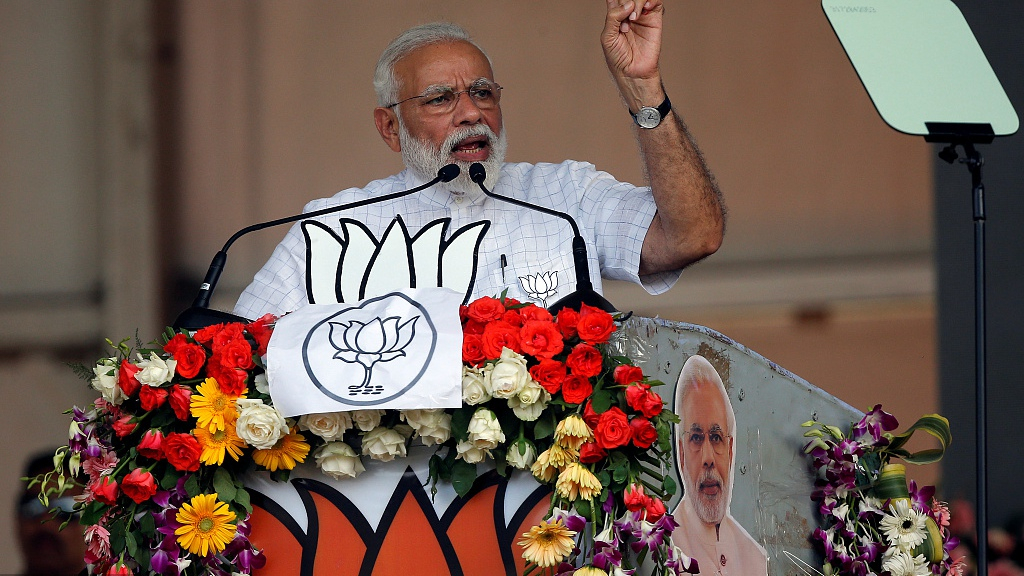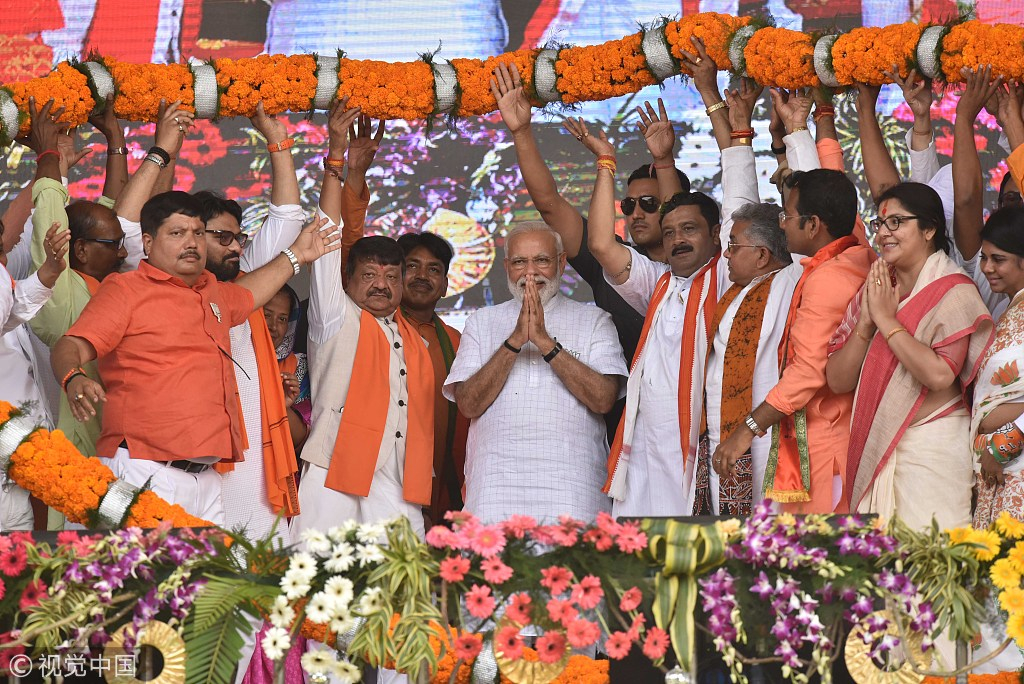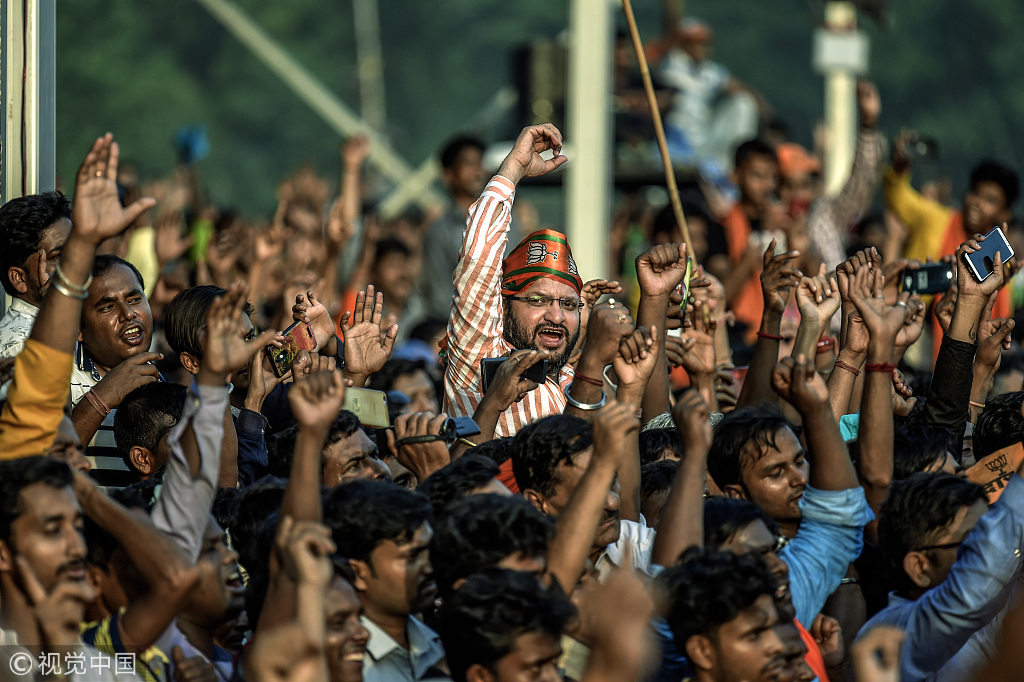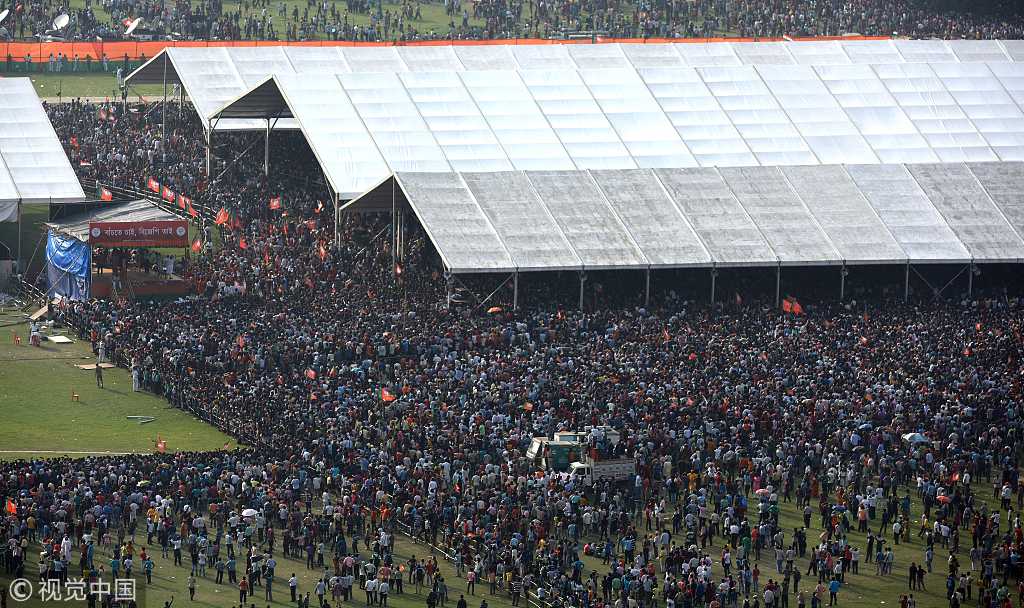
Opinion
12:49, 04-Apr-2019
Will Indian Prime Minister Narendra Modi win a second term?
Manisha Chakraborty

Editor's note: Manisha Chakraborty is an Indian freelance journalist. The article reflects the author's opinion, and not necessarily the views of CGTN.
With the declaration of the 17th Lok Sabha elections (lower house of parliament) from April 11 to May 19 in seven phases, the Indians are entering into the world's biggest ever democratic exercise which is virtually like a festival in the country. But the big question looming in the country right now is a simple but crucial one: Does Prime Minister Narendra Modi deserve a second term in the light of his Hindutva political narrative, warmongering speeches, and his government's shortcomings in five years?
Undoubtedly, the upcoming battle is a very complex election in which 900 million voters are going to vote either for a united India as demanded by the opposition parties of India or for a manufactured national pride along religious lines as projected by PM Modi and his Bharatiya Janata Party (BJP).
It is a fact that since the dramatic victory of Modi in the 2014 Lok Sabha, Modi-led BJP has lost its popularity since mid-2017. The saffron party lost many by-elections, and the final confirmation came with the Assembly elections in five states across India in November and December last year. The Chhattisgarh, Madhya Pradesh and Rajasthan defeats are a voter-delivered slap on BJP which demonstrates the fact that Modi's BJP no longer looks invincible in the forthcoming elections. Many poll-pundits opined that it is a tough task for the BJP to cross the majority mark of 272.

State BJP leaders welcome Prime Minister Narendra Modi with a giant garland during a political rally at Brigade Parade Ground ahead of Loksabha Election on April 3, 2019, in Kolkata, India. /VCG Photo.
State BJP leaders welcome Prime Minister Narendra Modi with a giant garland during a political rally at Brigade Parade Ground ahead of Loksabha Election on April 3, 2019, in Kolkata, India. /VCG Photo.
In the light of the Opposition Congress' victory in the assembly elections in three Hindi heartland states, and the erosion of Modi's charisma, it can be said that no more than 30 out of the 60 seats on offer from these three states for the BJP.
On the other hand, the BJP could win 20-25 seats this time from the politically crucial state Uttar Pradesh since the Samajwadi Party, Bahujan Samaj Party, and Rashtriya Lok Dal have allied with a combined vote share of 44 percent. Unofficially, the Congress is also a part of the grand alliance there.
Having entered the Lok Sabha fray as a candidate from Gandhinagar, the BJP president Amit Shah asserted that BJP's return to power is "not a challenge but a certainty," but the Modi-Shah duo should keep in mind the three Lok Sabha by-election results in Karnataka and the “poll debacle” in five states assembly elections at the end of the year signaled the beginning of the fall.
Realizing that the BJP would not perform well in western and north India, now the top saffron leaders have started to look the eastern region, which includes 42 seats in West Bengal, 14 in Jharkhand, 40 in Bihar, 21 in Odisha and 26 in the Northeast. But without hesitation, it can be said that the Citizenship Amendment Bill would affect BJP's "Look East policy" in the Northeast region.

The crowd at Indian Prime Minister Narendra Modi's public rally at Brigade ground on April 3, 2019, in Kolkata, India. /VCG Photo.
The crowd at Indian Prime Minister Narendra Modi's public rally at Brigade ground on April 3, 2019, in Kolkata, India. /VCG Photo.
Although the BJP had bagged two seats in the 2014 Lok Sabha elections and two in the 2016 Legislative Assembly elections in West Bengal, Amit Shah said that the saffron party would win as many as 23 Lok Sabha seats in West Bengal, which is known for a secular political culture.
But the fact is that under the leadership of Chief Minister Mamata Banerjee who is positioning herself as a potential Prime Ministerial candidate of the anti- BJP alliance, the ruling Trinamool Congress (TMC) virtually swept the BJP from the state during the 2018 panchayat elections.
With the voting date nearing, the BJP and Modi are resorting to communal politics to divide the nation. The languages used by the PM and other BJP leaders in their election campaigns are collective.
On March 29, Shah told that if the people of Bengal "want to stop illegal immigration from Bangladesh," then, they have to dethrone TMC government. Clearly, he aims to attract the Bengali Hindu vote bank which is around 60 percent.

Supporters of BJP gather for Prime Minister Narendra Modi's rally ahead of the Lok Sabha elections, at Brigade Parade ground on April 3, 2019, in Kolkata, India. /VCG Photo.
Supporters of BJP gather for Prime Minister Narendra Modi's rally ahead of the Lok Sabha elections, at Brigade Parade ground on April 3, 2019, in Kolkata, India. /VCG Photo.
It should be noted here that 27percent Muslim voters in the state never support the BJP in the light of post-Babri mosque demolition and 2002 Godhra riots. It is incredibly challenging for the Modi-Shah team to conquer the Bengal's voters by playing the National Register of Citizens card. The BJP's pro-Hindutva narrative will undoubtedly hurt its election prospects in West Bengal.
Five years is a long time in politics. But it is a fact that the Modi-led government's lofty promises of bringing good days remain mostly unfulfilled.
The ruling government's economic initiatives like demonetization, Goods and Services Tax (GST) failed to yield the desired results at the grassroots level. The common people of India are fed up with real issues like poverty, joblessness, bank fraud, lynching on the minority communities. Modi had promised 10 million jobs a year, but the National Sample Survey Office's (NSSO's) data showed that job creation was at a historic low in the current regime. It is sad but true that every institution — banks, media, courts, education and even armed forces had come under threat under the Modi government.
Since the 2019 election is complex and historic in its true sense, it is very hard to tell who will smile on May 23. But it can be hoped that Indian citizens will vote for an India that renews the promises made by the Constitution of India. The new government emerging from this year's elections will present a new India which will again become the best civilization in the world.
(If you want to contribute and have specific expertise, please contact us at opinions@cgtn.com.)

SITEMAP
Copyright © 2018 CGTN. Beijing ICP prepared NO.16065310-3
Copyright © 2018 CGTN. Beijing ICP prepared NO.16065310-3